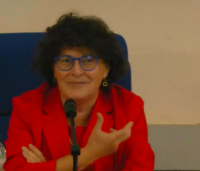Naming and “unnaming” after
To name a street, a square or a park after someone is not like acquitting them in court: presumption of innocence is not enough, extenuating circumstances are not enough, invoking the peculiar historical circumstances in which that person found themselves is not enough. Otherwise the majority of human beings would deserve to have named after them not only a street, but maybe also a school, an airport, the top of a mountain. Choosing someone to name something after, among the millions or the billions who have nothing named after them, it means choosing this person as a role model, identifying in their ideas, particularly admiring their actions. Who suggest to name a street after a fascist, does not suggest it in spite of them being fascist, but exactly because they were a fascist. Who suggests to name a street after an anti-semite, does not suggest it in spite of them being anti-semite, but exactly because they were an anti-semite. Moreover, they believe that fascism and anti-semitism will bring consensus.
This reasoning applies even more so for suggestions of unnaming after (I apologise for the neologism – the fact that this term does not exist shows how rare an instance this is). Lots of streets of our cities carry the name of people which are perfect strangers to us (often, not that perfect), yet nobody rallies to change them: usually we keep the streets’ names until we feel the urge to cut out a little piece to name it after someone else; and almost always it is, exactly, just one piece. In Turin, for example, the Community and the synagogue were, ironically, right in the street named after an anti-semite pope until Piazzetta Primo Levi was created, but our writer did not chase away the pope at all: he keeps on existing, unfazed, before and after the Piazzetta, with the numbering continuing as if the interruption was not there; and we are content with the Piazzetta without expecting to chase the pope away from the rest of the street. So, if someone suggests to unname a park currently named after two anti-mafia judges, it means exactly that the fight against mafia bothers them – and it is not just a slight bother, otherwise they would just cut out a piece; and obviously they believe that going after people that fight against the mafia will bring consensus. That is why it is rather disconcerting to think that a former Minister of Internal Affairs would defend someone taking such stands.
These observations take us to a rather sad conclusion. Let us assume that for some people historical and personal circumstances may legitimize a less severe judgment. Let us assume that people being anti-semite before the Shoah did not realize what the outcome of their ideas would have been; let us assume that some of those who arrested Jews and handed them over to the Germans really did not know what their fate would have been. But these extenuating circumstances cannot apply to people living today: who glorifies fascism and Nazism knows what fascism and nazism have been, and they glorify them exactly for what they accomplished. Who is anti-semite knows what the consequences of anti-semitism have been, and is glad about it. Who takes certain people as a role model knows who they were and what they did, and takes them as a role model exactly for who they were and what they did, not for the extenuating circumstances that a hypothetical court could find. And if we stop and think that these suggestions are brought on in the (presumably correct) belief that they will bring consensus, there is not much to be happy about.
Translated by Silvia Bozzo, student at the Advanced School for Interpreters and Translators of the University of Trieste, intern at the newspaper office of the Union of the Italian Jewish Communities.

